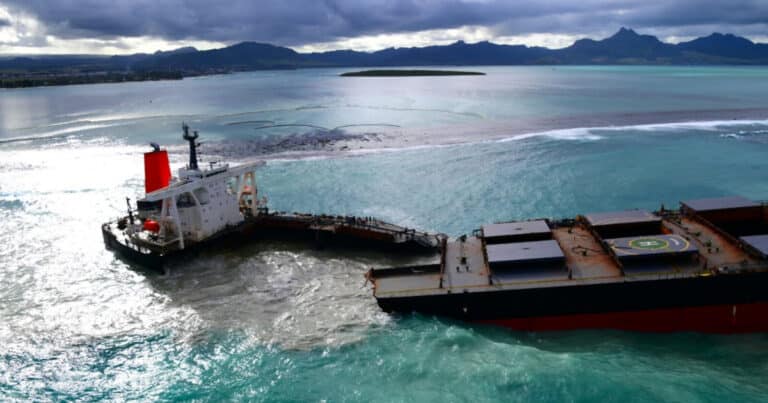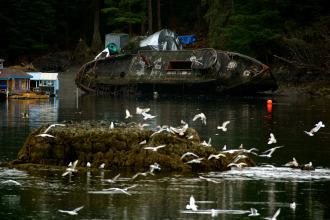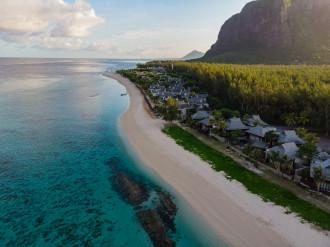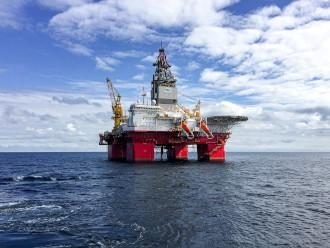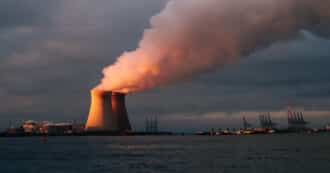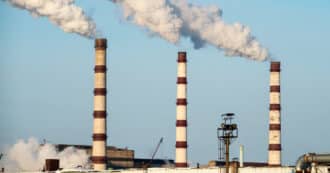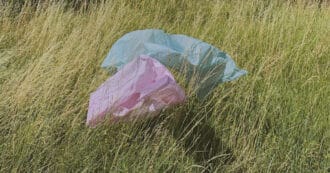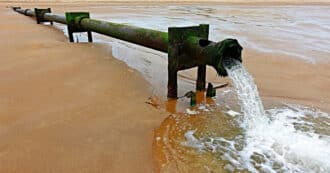By Sydney Cohen – The MV Wakashio oil spill is a tragedy that happened in August of 2020. It is believed to have started when a cargo ship called MV Wakashio lost power and drifted into a reef off Mauritius, in the Indian Ocean.
The accident caused 1,000 tons of fuel oil to leak from the vessel and pollute an area spanning more than 400 m deep.
Not only did the initial accident cause an environmental disaster, but the Mauritius oil spill also had an incredibly botched clean-up job, that claimed the lives of humans and more than 50 whales. Even the Pope got involved, calling for nature to be better respected.
MV Wakashio in the Indian Ocean
The MV Wakashio oil spill occurred when the Japanese bulk carrier ship MV Wakashio ran aground on a coral reef in the Indian Ocean south of Mauritius, leaking fuel in the following weeks, and breaking apart in mid-august.
Though most of the oil was drained before the ship broke apart, it was still estimated that around 1,000 tons of oil spilled into the ocean. Some scientists consider this the worst environmental disaster ever in Mauritius.
Two weeks after the incident, the Mauritian government declared the incident a national emergency, calling on help from around the world with clean-up efforts.
Oil Spills: Hazardous to the Environment
Oil spills are incredibly hazardous to the environment. Seawater has a high salt content, which means it’s difficult for oil to dissolve into it. This means that when an oil spill occurs, it often remains on top of the water surface and can’t be cleaned up by traditional methods.
Oil spills have devastating effects on marine life because of their toxicity and ability to suffocate animals if ingested or touched directly by them. There are many different types of species affected including fish, seabirds, sea otters, turtles, and dolphins, and they also affect human livelihood as well.
Species Affected By Oil Spills
It is not any singular species that could be vulnerable due to the dispersal of water-soluble chemicals within the water. Filter feeders, such as corals, crustaceans, and mollusks are often the first species to be affected. This particular incident also affected larger species quite drastically, as almost 50 whales were seen washed up on the beach in one week alone.
Bad weather in the two weeks after the incident forced the vessel to retreat to the coral reef. It pushed a lot of sand and broken coral over the reef towards the lagoon that created a sand bar around the reef.
The Human Impact of Oil Spills
Firstly, it was expected that the taxpayers living on the small island nation of Mauritius would go toward the oil spill clean-up, rather than the multi-billion dollar shipping lines that operate these vessels. However, thousands of people in Japan signed petitions demanding Nagashiki Shipping take responsibility for the incident and contribute to the clean-up, and fortunately, they’ve agreed to help fund not only the clean-up efforts but wildlife and ecosystem restoration projects as well.
Secondly, the fishing communities living in the region were no longer able to fish because the fish caught now contained high amounts of arsenic.
Impacts of Past Oil Spills
In 2010, the Deepwater Horizon disaster off the Gulf of Mexico witnessed nearly 600 million barrels of oil pumped into the air.
A commercial crude ship ran aground off France’s coast in 1978 and leaked 70 million gallons into the ocean. During the weekend a French air force unit was deployed to the islands of Réunion for an environmental cleanup.
However, in some jurisdictions, it appears that despite best efforts being employed, there is less than a 10% chance of a clean up after an oil spill. Scientists believe that it will be left for generations.
Oil Spill in Mauritius: Questions Mount Over Ship Fuel Safety
More than six months after the oil spill, officials in Mauritania were still waiting for the Wakashio gas rig to recover from its burning lands. The spill has been described by experts as the worst ecological disaster affecting the western Indian Ocean.
Coastal scientists are warning that even more vessels could be damaged by coral reefs in the Indian Ocean such as in this incident, and lead to further environmental pollution.
Oil Spill Clean Ups
Oil spills are disastrous for the environment and can devastate wildlife. Clean-up efforts often take years to complete, and there are many steps to take in order to clean up an oil spill. There is a lot of research that needs to be done in order to understand the magnitude and severity of the situation.
This includes understanding how much crude oil was spilled, what type it is, and where it has gone. Once this information is gathered, responders will know how best to manage and contain the damage caused by the spill.
What was the response to the Mauritius spill?
A French crew came first from nearby Réunion and put in ocean booms. The UN deployed experts in the area of oil spill management and crisis management. Marine ecologists were working from Japan and the United Kingdom.
The Mauritians took active action and constructed 80 kilometers of makeshift ocean booms. They managed to contain and remove nearly 75% of the oil, but the largest problem is that the oil has water-soluble substances that dilute into the water without scooping up the sediments. Only a tiny amount reached the sea, where it became difficult to clean.
What Ecosystems Were Affected by the Mauritius spill?
The ship was grounded just off Pointe d’Esny, north of Blue Bay Marine Park, a region considered a biodiversity hotspot and a part of the Ramsar Convention on Wetlands of International importance.
The Île aux Acrettes, near the wreckage, also was hit by the spill. The oil was dripping from a large and rare patch of marine grass where seahorses live. Coral reefs are also home to thousands of species, and the ship’s wreckage harmed many of the coral polyps, in addition to the oil killing off thousands of coral species.
Religious Responses to The Mauritius Oil Spill
Cardinal Maurice E. Piat, the Bishop of Port-Louis, spoke about his concerns over the oil spill: “I think especially of the people of Mahebourg and the villages on the southeast coast for whom the oil spill is not only an ecological disaster but a human disaster: the sea for them is their livelihood, and more (than that) it is a place of life, their passion. With the devastated lagoon, it’s a lifetime, a whole culture that collapses.”
Even the Pope offered prayers for Mauritius and expressed concern for their “environmental disaster.”
The government of Mauritius is working to clean up the oil and restore the environment, but this will take time, as most oil spills do. In order for our global society to live in harmony with nature we need a more sustainable future.
The Mauritius oil spill is an example of how devastating a natural disaster can be for people and wildlife in the region. There are many other examples throughout history where countries have been affected by natural disasters, including earthquakes and tsunamis. When these events happen it’s important to remember that they not only affect the environment but also human life.
* Featured image source

